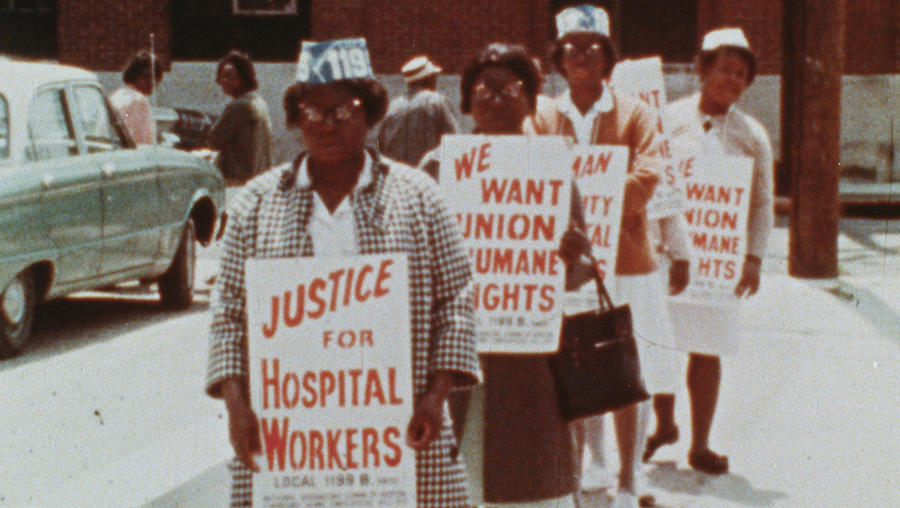[[{“value”:”
By Dan Albright
I AM SOMEBODY (1970) dir. Madeline Anderson. The Boston DSA Socialist Feminist Working Group, Afrosocialists and Socialists of Color Caucus, and Labor Working Group sponsored a virtual public screening of I AM SOMEBODY on April 10, 2021.
“I may be poor—but I AM SOMEBODY,” the striking hospital workers cheered, inspiring the title for filmmaker Madeline Anderson’s landmark 1970 documentary. Hundreds of workers, all but twelve of whom were women and all of whom were black, joined together to protest unjust firings and low pay at the Medical College of South Carolina Hospital in Charleston. They struck for over one hundred days, over one thousand people were jailed for committing civil disobedience, and the community withheld over $15 million from the local economy through their boycott.
At just over 30 minutes, I AM SOMEBODY is a can’t-miss for any unionist, socialist, or anyone seeking to affect change. The film demonstrates the meaning of unbreakable solidarity: something achieved not through the charisma of an influential leader, like other films that portray the civil rights era often imagine (as in 1970’s King: A Filmed Record or 1992’s Malcolm X), but through the formation of community, strength in numbers, and collective commitment to the common cause.
What sets the film apart is not just its rare footage of civil rights era labor struggle—workers holding the picket line in the face of bayonet-wielding National Guardsmen, resisting police attacks, walking with Coretta Scott King and thousands of supporters through Charleston—but the feminist perspective behind the camera, of Madeline Anderson, often cited as America’s first Black woman documentary filmmaker. Scenes of strikers’ domestic lives complement scenes of union militancy: a woman sees her reflection as she wipes her bathroom mirror; a mother holds her young child on the sidelines of a protest, watching police arrest her comrades; workers sustain themselves with rice and beans made on the strike HQ kitchen stove. A woman explains her decision to take the hospital job in the first place and what that meant as a married woman (in the late ‘60s, mind you), and Anderson’s camera pans over to her husband, seated next to her, for his reaction.
The film portrays the strikers as workers and as community members, creating a multi-dimensional portrait to remind us of their humanity. The church plays a significant role in supporting the strikers, giving space for rallies and raising funds. While Memphis sanitation workers’ signs the year before infamously read, “I am a MAN,” these women proclaim they are “some-body,” a nod to a collective identity, even still if in a body.
In a discussion after the film’s screening, audience members noted how today we could take inspiration from the women’s resolve. “1969 was a revolutionary moment,” said Amanda Achin, a member of the Labor Working Group, “and to see these workers ready to go on strike for 100 days to get what they wanted, to wear an arrest as a badge of honor, you can believe it.” Another noted how the women’s wage was $1.60 per hour and that 50 years later, the federal minimum wage for servers and other tipped workers (predominantly women) is still $2.13.
Colette Lima of the Socialist Feminist Working Group voted with other members to host the public screening: “It’s so incredibly important to discuss people generally underrepresented in labor movements, and how most struggles around labor are impacted by race and gender.”
As workers currently go into their seventh week on strike at St. Vincent’s hospital in Worcester, the struggle against exploitation and capitalism continues. The Charleston hospital workers’ strike and victory in 1969 remind us that another world is possible.
I AM SOMEBODY can be streamed via rental on Vimeo or a subscription to Ovidtv.
Dan Albright is a filmmaker, a member of the Boston Democratic Socialists, IUPAT Local 939, and an editor of Working Mass.
“}]]

